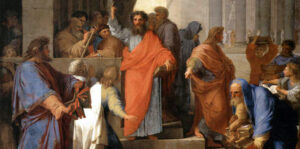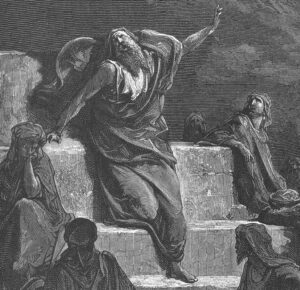By Dr. Don Bierle, FaithSearch President
Christianity is the largest religion in the world. There are groups claiming to be of the Christian faith, yet whose teaching differs from the mainstream. Some view the differences and say, “Do not judge.” Others wonder if the deviation is important enough to dispute or even break unity. How can we know?
Heresy
Both the Old and New Testaments distinguish between truth and error. The Lord spoke through the prophet Jeremiah,
The prophets are prophesying falsehood in My name. I have neither sent them nor commanded them nor spoken to them; they are prophesying to you a false vision, divination, futility, and the deception of their own minds.
(Jeremiah 14:14)
The apostle Peter said,
[F]alse prophets also arose among the people, just as there will also be false teachers among you, who will secretly introduce destructive heresies, even denying the Master who bought them… And many will follow their sensuality, and because of them the way of truth will be maligned.
(2 Peter 2:1-2)
The apostle Paul, writing to a troubled church at Corinth, identified three areas of heresy,
You seem so gullible: you believe whatever anyone tells you even if he is preaching about another Jesus than the one we preach, or a different spirit than the Holy Spirit you received, or shows you a different way to be saved. You swallow it all.
(2 Corinthians 11:4 LB)
How can you know if someone claiming to be a Christian has gone wrong? If they have:
- a different Jesus;
- a different spirit;
- a different Gospel; or
- a different authority.
I will examine these four sources of heresy in a three-part series. In this Part 1, I will discuss a heresy that goes all the way back to the first century and continues with some groups today: The Gospel PLUS something more is needed to be saved.
A Different Gospel
The Christian Church began at the Jewish feast of Pentecost (Acts 2) when they received the “baptism of the Holy Spirit” (Acts 1:5). They mistakenly assumed that salvation and Jesus the Messiah was for Judaism alone. Pharisaic Jewish believers in Jesus were known as “Judaizers.” Their views on salvation are expressed at the Jerusalem Council in Acts 15:5. “It is necessary to circumcise them [Gentiles], and to direct them to observe the Law of Moses.” In other words, you could not be saved unless you were converted to Judaism and kept the requirements of the Mosaic Law. It was the Gospel PLUS the Law and Jewish customs.
The Apostles’ Response

The Judaizers went to the Gentile churches which Paul had started in Galatia with this heretical Gospel. The apostle wrote to the churches:
I am amazed that you are so quickly deserting Him who called you by the grace of Christ, for a different Gospel…[they] want to distort the Gospel of Christ. But even though we, or an angel from heaven, should preach to you a Gospel contrary to that which we have preached to you, let him be accursed.
(Galatians 1:6-8 Emphasis added)
What did Paul preach? “For by grace you have been saved through faith, and that not of yourselves, it is the gift of God; not as a result of works, that no one should boast” (Ephesians 2:8-9 Emphasis added). Grace plus anything more is not the saving Gospel! The apostle Peter agreed: “But we [Jews] believe that we are saved through the grace of the Lord Jesus, in the same way as they [Gentiles] also are” (Acts 15:11).
Sola Gratia and Sola Fide
The Reformation of the Sixteenth and Seventeenth centuries established five “solas” (Latin).* Two of those are relevant to this article: sola gratia (by grace alone) and sola fide (by faith alone). The apostle Paul maintained this view already in the first century:
…for all have sinned and fall short of the glory of God, being justified as a gift by His grace through the redemption which is in Christ Jesus… For we maintain that a person is justified by faith apart from works of the Law.
(Romans 3:23-24, 28)
Contemporary Deviations from Grace and Faith Alone
Even though there is unity with Reformation theology in sola Christus (Christ alone) with some of the groups, all of them maintain a position in opposition to the Reformation theology of salvation by grace and faith alone.
- Mormonism – salvation is the result of obedience to the teachings of the Mormon Church, baptism, and the doing of good works. (Grace PLUS)
- Jehovah’s Witnesses – salvation is a reward for faithfulness (Grace PLUS)
- Christian Science – since sin, sickness, and death are illusions, there is no need of redemption. Man as God’s idea is already saved. (Grace denied)
- Catholics – outside the Roman Church there is no salvation; the sacrament of baptism is necessary to be saved. (Grace PLUS)
- Eastern Orthodox – Christ never explicitly revealed any alternate paths to salvation except in His one Church. God judges each person’s salvation based on how well a person lives. (Grace PLUS)
The Foundation of Assurance
If salvation is based on anything in addition to grace through faith, there can be no assurance. The nagging thought will always be whether I have done enough. We go to our deathbed still carrying the uncertainty of heaven expressed as “I hope, I hope…” But the truth is that it is not about our performance or man-made requirements (Mark 7:7b). The apostle Paul stated this assurance clearly:
I am not ashamed of the Gospel, because it is the power of God for the salvation of everyone who believes… For in the Gospel a righteousness from God is revealed, a righteousness that is by faith from first to last…
(Romans 1:16-17 NIV)
The apostle John linked the assurance of salvation by grace/faith alone with another “sola” of the Reformation, “solus Christus,” “For God so loved the world, that He gave His only begotten Son, that whoever believes in Him should not perish, but have eternal life” (John 3:16). In Part 2 of this series, I will discuss “a different Jesus” – heretical departures from “Christ alone.”
*The five solas of the Protestant Reformation, which distinguished the Reformers from the teachings of Rome and the political and spiritual authority of the papacy, are: sola scriptura (Scripture alone), solus Christus (Christ alone), sola fide (faith alone), sola gratia (grace alone), and soli Deo gloria (glory to God alone).




